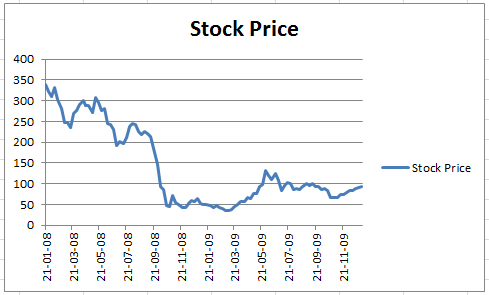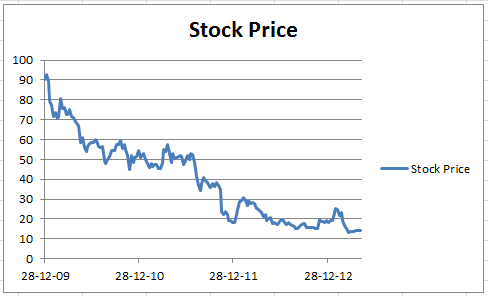Article Reader
Story: A.V.Gupta (Curse of Averaging Out)
This is just a fictional story to explain the repercussions of holding and averaging out a falling stock. Character in this story is fictitious. Stock described in the story is closely based on a real stock data. This story has no intention of pointing out any specific issue with particular stock. The behaviour of the stock in this story is generic and can be observed with many stocks at one point of time.
Mr. A.V.Gupta is a very busy executive in an MNC. His medium of buy/sell is his broker. His broker also works as free consultant to him and calls him in very loyal way whenever opportunity knocks the door. In January, 2009 Mr. Gupta got a call from his broker: ...Sir, we have opportunity to buy a stock at Rs.90. The stock's IPO was priced at Rs.500, however due to some issues it crashed down to Rs.35/- and now it has shown clear signs of recovery at Rs.90/-. Company is leader in energy generation field and it has presence across multiple continents. They provide end to end solution to customers ...

Chart of the Stock, January 2009
Keeping in mind logic of recovering up to IPO price (Rs.500), Mr. Gupta put major chunk of his money in that stock. Unfortunately, it started tumbling down from the point where Mr. Gupta bought. After that he started getting call every 3-4 month from his broker that the stock has hit 52 week low insisting Mr.Gupta to buy more in order to Average Out . Hoping to get out and recover all his money Mr.Gupta gave consent to buy more. Mr. Gupta's average buy price is now Rs.40 and the stock's current price is Rs.15/-. He has given more than 60% budget of his equity investment to one single stock where he is suffering 60% loss of investment value (apart from risk free interest he has lost on his money). Ideally he should have never given more than 10% share to one single stock (read Power of Right Composition).

Chart of the Stock, April 2013
If Mr. Gupta would have filed a loss of 20% (Rule-X) at Rs.72/-, which was 3 years back from now (April, 2013) then he would have recovered his loss by putting the money in fixed deposit. Conclusion: 1. Filing a loss is a wise decision at times before it hits the situation of un-repairable loss. 2. Averaging out looks very appealing logic in the first place, but, it is the beginning of vicious spiralling down cycle. Even if one wins this battle (appears to be) actually it is net loss. (read story of Mr.S.P.Tripathy & Mr.A.P.Sharma)
Do you have any query? Please write to us:
Did you like this article? Please share it with your social network

